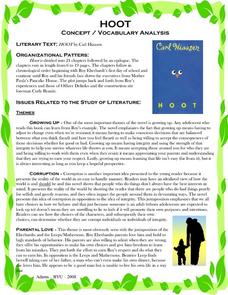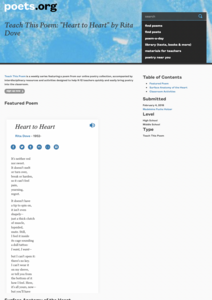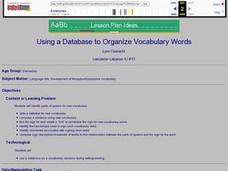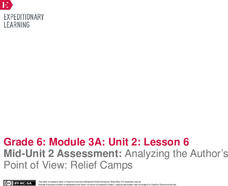Curated OER
The Metamorphosis: Vocabulary Bingo
Franz Kafka's The Metamorphosis is one of the most fascinating pieces of literature from the 20th century, and its rich vocabulary is one of the reasons it has endured for over a century. Help learners of all levels work...
Novelinks
The Tempest: List-Group-Label (After Reading)
Collaborate with your class after reading William Shakespeare's The Tempest with a group labeling activity. As you note key concepts or words from the play on the board, class members suggest associations and connections...
K20 LEARN
That Which We Call a Rose: Connotation and Denotation in Romeo and Juliet
Words carry weight. And some words carry baggage. Scholars learn the difference in a study of connotation and denotation. Individuals sort the cards into three groupings using words from Shakespeare's play. After sharing within groups,...
Bowland
Fares Not Fair
What would be a fair fare for a taxi? to answer the questions requires young mathematicians to analyze data on fuel prices and taxi cab fares. They determine and justify a fair fare price.
Curated OER
Current Event Project
One of the best ways to make history relevant and engaging is to analyze current events before they become history! Check out these project guidelines for a current event research paper, outlining the major required sections of...
Curated OER
Hoot: Concept/Vocabulary Analysis
Augment your unit on Carl Hiaasen's Hoot with a series of activities about the environment, civil disobedience, making an impact in the world, and growing up. A list of literary concepts and themes helps you to write your lessons to...
Really Good Stuff
English/Spanish Cognates: Food
Everyone loves food! Help your English language learners pick up some vocabulary with a series of activities based around cognates and food. Pupils practice each word and focus on the words in-depth by filling out Frayer model...
Academy of American Poets
Teach This Poem: "Heart to Heart" by Rita Dove
Take heart! Here's a lesson that will encourage learners to notice details. After listening to Sarah Vaughan singing "My Funny Valentine" and noting how the word heart relates to Valentine's Day, scholars observe a human heart image....
EngageNY
Normal Distributions (part 1)
Don't allow your pupils to become outliers! As learners examine normal distributions by calculating z-scores, they compare outcomes by analyzing the z-scores for each.
California Education Partners
Glass Menagerie
As a reading comprehension assessment, ninth graders are asked to use evidence drawn from The Glass Menagerie to support an analysis of how Tennessee Williams uses specific lines to develop Amanda's character as well as her...
EngageNY
Selecting a Sample
So what exactly is a random sample? The 15th part in a series of 25 introduces the class to the idea of selecting samples. The teacher leads a discussion about the idea of convenient samples and random samples. Pupils use a random...
CCSS Math Activities
Smarter Balanced Sample Items: 6th Grade Math – Target F
Why does one person need 58 peaches; isn't that a bit excessive? This classic math dilemma offers pupils a chance to turn a word problem into an algebraic equation. Grade 6 Claim 1 Item Slide Shows includes this problem as part of a...
Teach Engineering
Let's Learn About Spatial Viz!
Can you see your class working on spatial visualization? The first installment of a five-part module introduces the concept of spatial visualization and provides a 12-question diagnostic assessment to test spatial visualization skills....
ReadWriteThink
Heroes Are Made of This: Studying the Character of Heroes
What makes heroes and villains? A six-part unit plan asks young scholars to explore the concept of heroism and the characteristics they consider heroic and unheroic. Groups create character maps that focus on how characters are shaped by...
Curated OER
Pride and Prejudice: Concept/Vocabulary Analysis
Clarify the setting, literary themes, and potential vocabulary issues with a concept analysis resource. With thoughtful explanations of many parts of Jane Austen's Pride and Prejudice, the reference sheet will be a great...
Curated OER
Using a Database to Organize Vocabulary Words
Students use a database as a vocabulary resource during writing/reading. They preview stories and list unknown works into their reading notebooks. Students find the definitions, and enter their words into a database using a teacher...
Curated OER
Parts of a Spreadsheet
Students create their own spreadsheet. They identify the different parts that make up a spreadsheet and organize their data. They practice using functions and formats.
Curated OER
Lesson: Mad Lib Leigh!
A fun and quirky painting is analyzed for details in an art/literacy lesson plan. Youngsters look for colors, shadows, and details and then describe them using vivid language. They use the words from discussion to complete a fun Mad...
Polar Trec
Ozone Data Comparison over the South Pole
Did you know the hole in the ozone is seasonal and filled by January every year? The lesson uses scientific measurements of the ozone over the South Pole to understand patterns. Scholars learn that the hole grew bigger annually before...
NASA
Revising an Investigation
Write, edit, and then revise! The fourth lesson in a five-part series asks peers to provide feedback on research. Individuals then use the research to edit and revise conclusions and develop their presentations.
Curated OER
Titration: Standardization of a Base and Analysis of Stomach Antacid Tablets
Titration experiments don't have to give your high schoolers a stomachache. Study the ways to titrate an acide with a base in an engaging science experiment, which involves creating solutions and performing titrations. Pupils...
EngageNY
Mid-Unit 2 Assessment: Analyzing the Author’s Point of View: Relief Camps
We're halfway there ... what a relief! Scholars read an excerpt from a primary source about the relief camps associated with the1906 San Francisco earthquake. Next, they complete a mid-unit assessment, answering short-answer and...
West Contra Costa Unified School District
Writing Exponential Functions Based on Data
Give your class a concrete example of exponential growth and decay using this hands-on activity. These Algebra II lessons allow for the exploration of exponential growth and decay models, as well as the discovery of the patterns of...
Little Stones
How Can Poetry Make People Think and Care?
Can beautiful words change the world? Literary scholars discover how to paint their visions of change using poetry in a series of three workshops. Each independent topic gives participants a chance to examine their feelings about...























